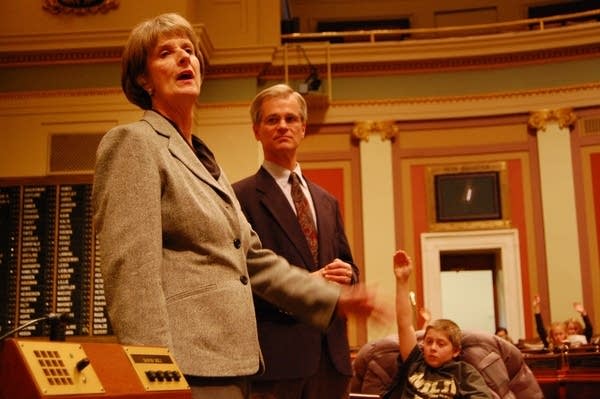Schools brace for rough Legislative session
Go Deeper.
Create an account or log in to save stories.
Like this?
Thanks for liking this story! We have added it to a list of your favorite stories.

As the economy has worsened in recent months, school leaders across Minnesota have slowly started to give up hope that next year's state budget will include significant increases in education funding. There hasn't even been any guarantee at this point that funding will stay at current levels.

But that's not putting a crimp in Mindy Greiling's plans.
"Because of bad economy, we need this more than ever," said the DFL lawmaker from Roseville. Greiling is sponsoring legislation she calls the 'New Minnesota Miracle.'
Her legislation is a wide-ranging overhaul of the way the state funds schools and includes more money for schools. Greiling still plans to push the measure this year, even with the deficit.
Turn Up Your Support
MPR News helps you turn down the noise and build shared understanding. Turn up your support for this public resource and keep trusted journalism accessible to all.
Gov. Pawlenty and other critics say the plan needlessly raises hopes and promises lots of great stuff without saying how to pay for nearly $2.5 billion in new spending. That $2.5 billion is the amount of the fully-implemented plan - the idea all along was to take a number of years to get to that level.
"The goal always was to take it bites at a time and implement it when we're able," Greiling says. "It's a package and the whole package is joined at the hip. Each piece of it will be phased in as the money is available."

Greiling's bill would boost the amount the state sends schools for each student. But the measure also changes a lot of the finer details of school finance, like how you count students in the first place.
As for the governor, he hasn't yet shown his cards on education, except to say it will be a priority in his budget for next year. K-12 was spared from cuts last month when Pawlenty moved to fill a gap in this current year's budget, but he did cut $20 million each from the University of Minnesota and the MnSCU system.
Non-budget matters
All this money talk obscures the other education issues on the table this year that aren't related to the budget.
One of them is the GRAD, a test all high schoolers have to pass to graduate. The test is imbedded in the yearly MCA standardized test, so students don't know which questions count towards which score. But for the first time this year, the GRAD math test will take place in the 11th grade.
That's raised concerns from schools and parents. They wonder if students who fail the GRAD will have enough time to pass a make-up before graduation.
"We find it contrary to best practice to believe a student that hasn't reached a proficiency in math after 11 years of instruction is able to become proficient in the short window of time between receiving test results and being able to re-test," noted Thel Kocher, an administrator in the Edina School District, while recently addressing lawmakers at a committee meeting.
Any change to the GRAD test might come very early in the session if the state's department of education has any say. The agency has asked for quick action to give it time to implement the changes.
Another topic is charter schools. Some lawmakers have been discussing possible changes to the way Minnesota regulates charters. Possible items include everything from how much oversight should come from the state and how much should come from a charter school sponsor, to whether there should be a moratorium on new charters.
Sen. Kathy Saltzman, DFL-Woodbury, says she hopes any legislation coming from the discussions will look at the entire charter school system - not just one or two aspects.
"We have not had an open discussion about charter schools in a very long time," said Saltzman, in an interview. "There have been specific proposals that have been brought forward and then we've debated a specific proposal.
"I think we can do some very good work, but it's going to require people to have an open mind and think about our students first."
One group that advocates for charters - the Minnesota Association of Charter Schools - will outline proposals it will push for at a news conference Thursday.
Gov. Pawlenty has outlined a number of policy changes he's supporting this year. Many of those ideas have come up in years past but haven't yet won approval. They range from a state summer school program to tougher standards for college students wishing to major in Education.
The governor is also expected to renew his push for more online education. He'd like a law, for example, that requires all high schoolers in Minnesota to take at least one class online before graduating.
The governor and his wife, Mary, discussed online education on Pawlenty's weekly radio show last week.
"If you can find students who are properly motivated and properly led, it's a great idea," said Mary Pawlenty. The governor agreed.
The governor has said online education also costs less to offer, which could help budgets long-term. If nothing else, that argument shows that even when lawmakers aren't talking about direct budget matters, they'll probably still be talking about money.



